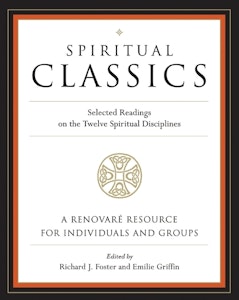 Excerpt from Spiritual Classics
Excerpt from Spiritual Classics
Sins of Infirmity
There is no condemnation for “sins of infirmity,” as they are sometimes called, resulting from involuntary defects of our human finitude. Perhaps it is better instead to call them simply “infirmities,” or “human frailties,” in order that we may not seem to lend legitimacy to sin, or to excuse it in any way by coupling it
too directly with human finitude. Although “sin of infirmity” remains an ambiguous and somewhat dangerous expression, by it I mean primarily in voluntary failings. One example would be saying something we believe to be true, though in fact it later proves to be false. Another example: hurting our neighbor without knowing or intending it, or even when we intended to do good. Although these are deviations from the holy, acceptable, and perfect will of God, ye they should not properly be called sins because they lack the element of being willed. Thus they do not add any guilt to the conscience of “those who are in Christ Jesus.” They cause no alienation or breach between God and the faithful. They do not cloud the light of God’s shining. They are in no way inconsistent with the general character of one who “walks not after the lower nature, but after the Spirit.”
Unpreventable Sins
There is no condemnation to believers for anything conceivable that is beyond their power to prevent. This refers both to inward attitudes and outward actions, both to doing something and to leaving something undone. For example, sup pose the Lord’s Supper is celebrated but you do not partake of it because of sick ness-an omission indeed, but one you cannot help. There is here no condemnation and no guilt, because there is no choice. Paul writes: “Provided there is an eager desire to give, God accepts what a man has; he does not ask for what he has not” (2 Cor. 8:12).…
Sins of Surprise
Then there are so-called sins of surprise; for example, when one who is usually patient speaks or acts in a way that violates the command to love the neighbor due to some sudden or violent temptation. These cases are far more difficult to analyze. It is not easy to fix a general rule concerning misdeeds of this sort. We cannot flatly say either that persons are or are not condemned for these types of highly uncharacteristic behavior. Whenever a believer is overtaken in a fault by surprise, however, there must be some degree of guilt proportional to the degree of concurrence of the will. In proportion as a sinful desire, word, or action is more or less voluntary, so we may suppose that God is more or less displeased; and there is more or less of a burden of guilt to bear.
If so, then there may be some “sins of surprise” that rightly elicit a sense of guilt and condemnation. Admittedly, in some instances our being surprised is due to some wilful and culpable neglect. Perhaps we could have been attentive to some thing that could have been prevented or shaken off before the temptation came. We might have been adequately forewarned that trials and dangers were at hand and yet have said in our hearts: “A little more slumber, a little more folding of the hands in rest.” Suppose one later falls unaware into a trap that might easily have been avoided. Inattentiveness is hardly an excuse, for one might have foreseen and averted the danger. Falling, even by surprise, in such an instance as this is, in effect, a wilful sin and, as such, must expose the sinner to condemnation, both from God and from one’s own conscience.
Sins of Disobedience
On the other hand, there may be sudden assaults, either from the world or the god of this world, and frequently from our own distorted imaginings, which we did not, and hardly could have, foreseen. Believers who are weak in faith may be overcome by these assaults; they may become inordinately angry or think badly of others with only a very slight concurrence of the will. In such a case, God-who jealously cares for their souls-would undoubtedly show them that they have acted foolishly, in order to convince them that they had swerved away from the perfect law, from the mind which was in Christ. Consequently, they would feel grieved with a godly sorrow and lovingly ashamed before God. But they do not need to feel condemned. God does not charge them with folly, but has compassion, even “as a father has compassion on his children” (Ps. 103:12). This is why their hearts do not condemn them. For even in the midst of that sorrow and shame they can still say:
God is indeed my deliverer.
I am confident and unafraid;
for the LORD is my refuge and defense
and has shown himself my deliverer.
And so you shall draw water with joy
from the springs of deliverance (Isa. 12:2).
You of little faith
It is fitting that we try to draw some practical inferences from all this.
Why are you afraid of your past? For there is now no condemnation of past sins “for those who are united with Christ Jesus” (Rom. 8:I ), when the “law of the Spirit has set you free ” (Rom. 8:I ). O you of little faith! Even though your sins were once more in number than the sand, so what? You are now in Christ Jesus! “Who will be the accuser of God’s chosen ones? It is God who pronounces acquittal; then who can condemn?” (Rom. 8:33).
All the sins you have committed from your childhood right up to the moment when you were “accepted as his sons through Jesus Christ” (Eph. 1:5) are driven away as chaff. They are gone. They are lost. They are swallowed up. They are remembered no more. You are now “born” from spirit (John 3:6). Why are you afraid? Wh y be troubled even about what happened before you were born? Throw away your fears! ” For the spirit that God gave us is no craven spirit, but one to inspire strength, love, and self-discipline” (2 Tim. 1:7). Know your calling! Rejoice in God your Savior and give thanks to God your Father through Him.
How Christ Frees Us
Some will say, “But I have once again done serious wrongs, even after receiving this redemption. I seem like a lost cause. I still feel deep remorse.” It is fitting that you feel a proportional remorse after doing wrong. For it is God who has awakened this very feeling in you. But you are now invited to transcend it in trust. Hasn’t the Spirit also enabled you to say, ” But in my heart I know that my vindicator lives, and that he will rise last to speak in court” (Job 19:25); and “the life I now live is not my life, but the life which Christ lives in me; and my present bodily life is lived by faith in the Son of God” (Gal. 2:20). It is that faith that cancels all that is past, and in it there is no condemnation. At whatever time you truly believe in the name of the Son of God, all your sins prior to that time vanish like the morning dew. “Christ set us free, to be free men. Stand firm, then, and refuse to be tied to the yoke of slavery again” (Gal. 5:1). Christ has once again made you free from the power of sin, as well as from its guilt and punishment. So do not become entangled again in the yoke of bondage — its twisted desires, distorted emotions, its vile words and works, the most desperate bondage this side of hell. Refuse to be caught again in bondage to slavish, tormenting fear or self-condemning guilt.…
Look inward, honestly
There is no condemnation for any inward sin still remaining in those who “walk by the Spirit.” Even though sin may seem to cling tenaciously to everything we do, we are not guilty as long as we do not give way to it. So do not be disturbed because some ungodly imaginations remain in your heart. Do not feel dejection because you still come short of the glorious image of God; or because pride, self will or unbelief cling to all your words and works. Do not be afraid to face candidly all these distortions of your heart. Know yourself as you are known. Desire fervently of God that you may not think more highly of yourself than you ought to think. Let your continuous prayer be:
Show me, as my soul can bear,
The depth of inbred sin;
All the unbelief declare,
The pride that lurks within.
As God hears your prayer, he will let you see your heart. Then he will show you in entirety the spirit to which you belong. Then take care that your faith does not fail you, or that your protection is not torn from you. Now you are free to see yourself quite openly even at your lowest, to be humbled in the dust, to see yourself as nothing, less than nothing, and empty. At that very moment you may still “set your troubled hearts at rest, and banish your fears” (John 14:27). Remember that you, even you, have an Advocate “with the Father, Jesus Christ, and he is just” (1 John 2:1). Hold fast to the recollection that “as the heaven stands high above the earth” (Ps. 103:11), so is God’s love higher even than my sins.
God is Merciful
God is merciful to you, a sinner! Precisely the sinner you are! God is love, and Christ has died! That means: the Father himself loves you! You are his child! God will not withhold from you anything that is for your good. Is it not good that the whole body of sin, which is now crucified in you, should be destroyed? It shall be done! You shall be cleansed “from all that can defile flesh or spirit” (2 Cor. 7:1). ls it not good that nothing should remain in your heart but the pure love of God alone? Take joy in all of this. “Love the Lord your God with all your heart, with all your soul, with all your mind, and with all your strength”; and “love your neighbor as yourself’ (Mark 12:30, 31). Stand firm in the “conviction of his power to do what he had promised” (Rom. 4:21). It is your part patiently to continue in the work of faith and the labor of love, in cheerful peace, humble confidence and with calm and accepting, but fervent, expectation, to wait until the zeal of Lord of hosts shall perform this work in you.
Leap and Walk
If those who are “in Christ” and “walk in the Spirit” are not condemned for sins of infirmity or for involuntary failings or for anything they are unable to prevent, then take care, all you who have newly born faith in God’s mercy, that you do not just at this point give the devil a huge advantage. You are still unformed and weak, lacking in clear insight and deep knowledge. You are more vulnerable than words can express, more prone to error than you can imagine. For you do not yet under stand faith as fully as you intend. So do not let this weakness and untested judgment, or any of its fruits which you are not yet able to avoid, shake your basic faith, your filial trust in God, or disturb your peace or joy in the Lord. The very idea that sin must be willed can itself be dangerously misapplied, so it is wiser and safer if it is applied only to the case of weakness and infirmities.
If you have stumbled, O seeker of God, do not just lie there fretting and bemoaning your weakness! Patiently pray: “Lord, I acknowledge that every moment l would be stumbling if you were not upholding me.” And then get up! Leap! Walk! Go on your way!” Run with resolution the race “in which you are entered (Heb. 12:1 ).
Just Love God
My last point: Even if you find yourself for a moment to your amazement doing exactly what your soul otherwise detests, this is still not reason to feel overburdening guilt. Let us hope that your being surprised is not due to your own careless ness or wilful neglect. If, while you believe, you are suddenly overtaken in a fault, then let the Lord immediately hear your cry of grief. It will then be felt by you as a healing ointment. Pour out your heart before God. Declare your trouble. Pray with all your might to God who is fully able “to sympathize with our weaknesses” (Heb. 4:15). God wants to establish, strengthen, and settle your soul and not allow you to fall again; but, meanwhile, God is not harshly disapproving of you. So why should you be afraid? You have no reason to fall into the grip of the fear that “brings with it the pains of judgment” (I John 4:18).
Just love God who loves you. That is sufficient. The more deeply you love, the stronger you will feel. And as soon as you have learned to love God with all your heart, “if you give fortitude full play you will go on to complete a balanced character that will fall short in nothing” (James l :4). Wait in peace for that hour when “God himself, the God of peace,” will “make you holy in every part, and keep you sound in spirit, soul, and body, without fault when Our Lord Jesus Christ comes” (1 Thess. 5:23)!
Consider doing the following in private, at a white board or blackboard. Write a brief description of the worrisome sin or sins, and then erase the board vigorously. Thank God for sins forgiven, and make a fresh start.
Reflections from Richard J. Foster
It is so refreshing to read someone who takes sin seriously as a subject about which we can actually have knowledge. Most today, even among religious leaders, avoid the subject like the plague. And those who do talk about it usually do so only to rail against it. Here we have someone who deals with sin as a body of knowledge and who further believes that guidance can be given on how to deal with both the sin nature and the habits of sin.
The distinction Wesley is making between “sins of infirmity,” “sins of surprise,” “sins of disobedience,” and so forth has to do with gradations of intention, human will, and voluntary choice. This is an ancient distinction but one that is little under stood today. It is not understood for two reasons: first, we today lack a proper ontology of the human person, hence we do not know how the will fits into the overall makeup of personality, and, second, we den y volition on all sides. The last thing we want today is to be responsible for our intents and actions, and so we merely den y the function of the will and our ability to take up a freely chosen course of action for our lives. I think Wesley’s option holds out more promise for successful living.
Did you notice the great pastoral care Wesley gives throughout this selection? He helps people understand the failures and shortcomings that should not be considered sin proper and relieves people of excessive guilt over those matters. And even in areas where sin is recognized for what it is and dealt with, he is so very pastoral: “God wants to establish, strengthen, and settle your soul and not allow you to fall again; but, meanwhile, God is not harshly disapproving of you. So why should you be afraid? You have no reason to fall into the grip of the fear that ‘brings with it the pains of judgment’ (1 John 4:18).”
Excerpted from Spiritual Classics: Selected Readings on the Twelve Spiritual Disciplines, edited by Richard Foster and Emilie Griffin (New York: HarperOne, 2000), pp. 337 – 344.
Text First Published January 2000



